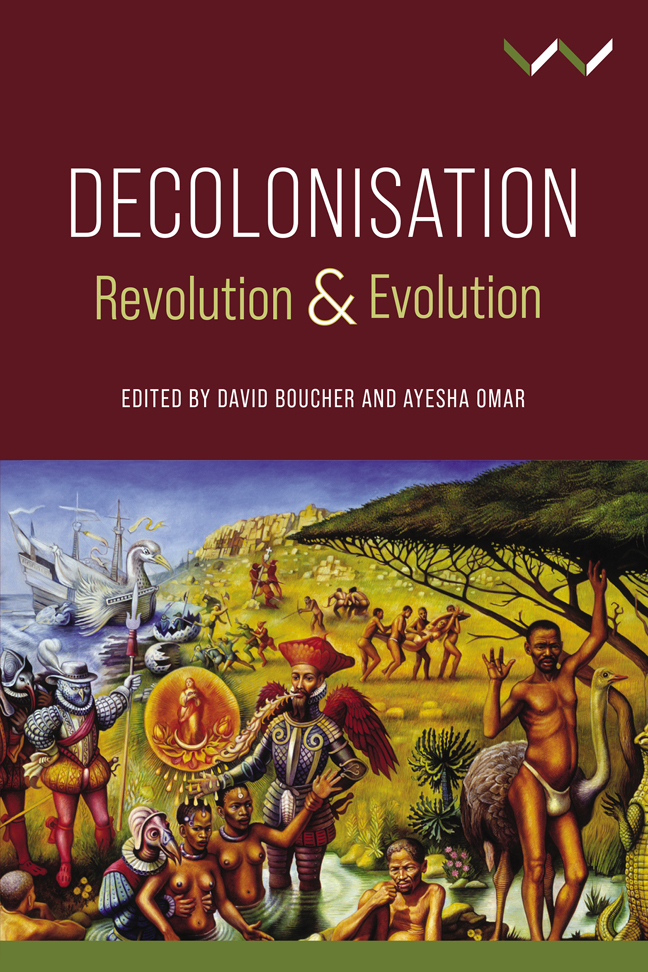Book contents
- Frontmatter
- Contents
- Acronyms
- Introduction: Decolonisation: Interdisciplinary Perspectives
- Chapter 1 The Invention of Blacks: Notes on Conquest, Fear and Time
- Chapter 2 The Decolonisation of Southern Africa: Historical Reflections
- Chapter 3 The Border of Trust at Kat River for Coloured Settlers, 1851–1853
- Chapter 4 Decolonisation and the Enduring Legacy of Colonial Borders in Africa
- Chapter 5 Fanon's Challenge: Identity, Recognition and Ideology
- Chapter 6 Beyond Redemption: Unsettling Progressive-Romantic Storyings of Colonial Injustice in Western Critical Thought
- Chapter 7 The Limits of Decolonisation and the Problem of Legitimacy
- Chapter 8 Decolonisation – Real and Imagined
- Chapter 9 Decolonisation and the Crisis of African Literature in the Twenty-First Century
- Chapter 10 Pedagogical Disobedience in an Era of Unfinished Decolonisation
- Contributors
- Index
Chapter 2 - The Decolonisation of Southern Africa: Historical Reflections
Published online by Cambridge University Press: 01 March 2024
- Frontmatter
- Contents
- Acronyms
- Introduction: Decolonisation: Interdisciplinary Perspectives
- Chapter 1 The Invention of Blacks: Notes on Conquest, Fear and Time
- Chapter 2 The Decolonisation of Southern Africa: Historical Reflections
- Chapter 3 The Border of Trust at Kat River for Coloured Settlers, 1851–1853
- Chapter 4 Decolonisation and the Enduring Legacy of Colonial Borders in Africa
- Chapter 5 Fanon's Challenge: Identity, Recognition and Ideology
- Chapter 6 Beyond Redemption: Unsettling Progressive-Romantic Storyings of Colonial Injustice in Western Critical Thought
- Chapter 7 The Limits of Decolonisation and the Problem of Legitimacy
- Chapter 8 Decolonisation – Real and Imagined
- Chapter 9 Decolonisation and the Crisis of African Literature in the Twenty-First Century
- Chapter 10 Pedagogical Disobedience in an Era of Unfinished Decolonisation
- Contributors
- Index
Summary
The word ‘decolonisation’ is now used in a wide variety of settings, with many different meanings. The reflections that follow concern political decolonisation, in the sense of a process that ended colonial rule (of which apartheid can be seen as a form). My interest here is in how and why the different cases of colonial rule came to an end in Southern Africa, the last part of the continent to be decolonised. I define this region as the southern portion of the African continent, including what is now the Democratic Republic of the Congo (DRC), which became a member of the main regional organisation, the Southern African Development Community (SADC), in 1997. Though the process leading to the end of colonial rule happened in many different ways and in widely different environments, from the tropics to the Cape of Good Hope, there was an overall process involved, if a very complex one, that covered the whole region. The way it unfolded was heavily contingent on time and place, but one can draw out certain central themes, and, as with any historical process, raise basic questions: ‘what happened?’ ‘why did it happen?’ and ‘what was the outcome, and what is its significance?’ There is not space here for a comprehensive overview, but an attempt will be made to address these questions.
The large literature on political decolonisation in the late twentieth century includes a number of general studies of the ways such decolonisation took place in West Africa and tropical Africa, but in 2022 there was no major study of the overall process in Southern Africa, nor one that addressed the main questions that need to be asked, or saw the process in context, even though we are now almost 30 years from its end. While there are overviews for individual countries and some brilliant in-depth treatments of particular actors, such as those by Piero Gleijeses on the Cubans in Angola (Gleijeses 2013) and by Roger Southall on liberation movements in power (Southall 2013), no work considers how the whole region was decolonised, bringing in comparative perspectives. At least part of the reason for the lacuna is the multifaceted nature of the decolonisation process.
- Type
- Chapter
- Information
- DecolonisationRevolution and Evolution, pp. 57 - 74Publisher: Wits University PressPrint publication year: 2023



